Module 2 My home town and my country Unit 1 It's taller than many other buildings. 课件26张
文档属性
| 名称 | Module 2 My home town and my country Unit 1 It's taller than many other buildings. 课件26张 | 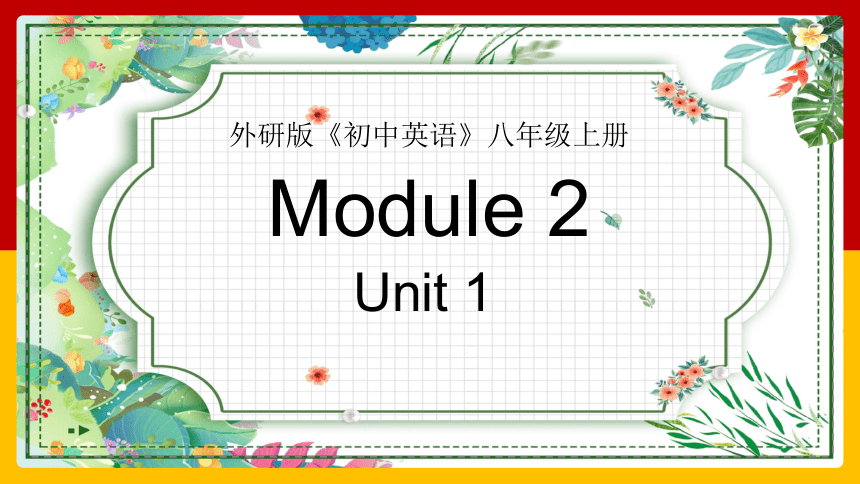 | |
| 格式 | ppt | ||
| 文件大小 | 2.6MB | ||
| 资源类型 | 教案 | ||
| 版本资源 | 外研版 | ||
| 科目 | 英语 | ||
| 更新时间 | 2021-09-11 09:47:15 | ||
图片预览


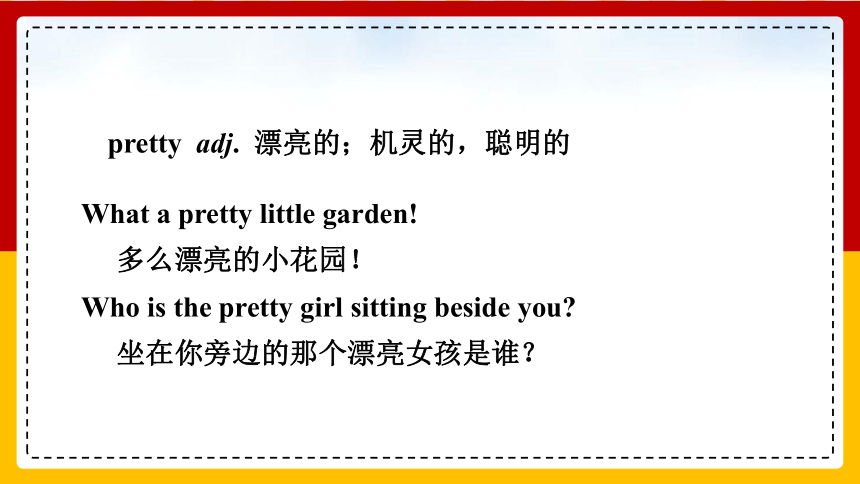
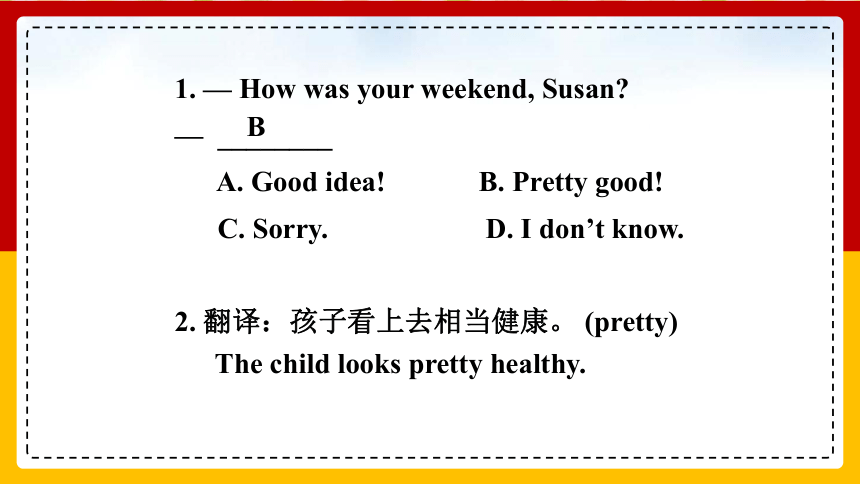
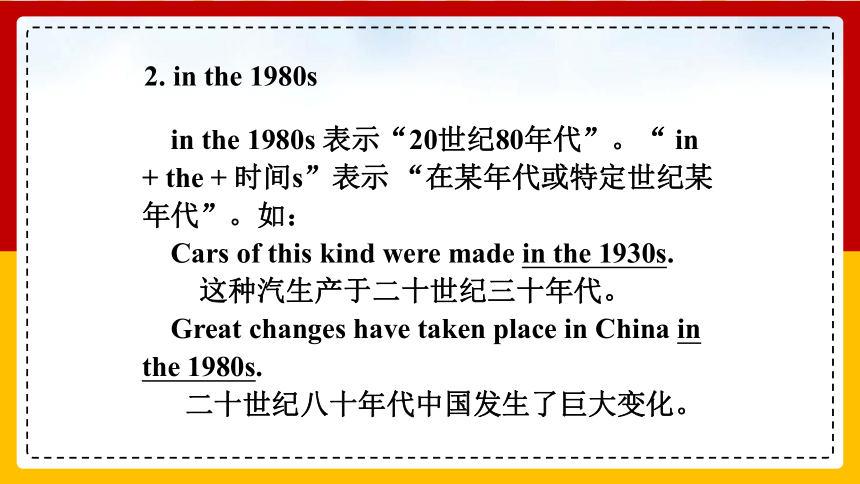

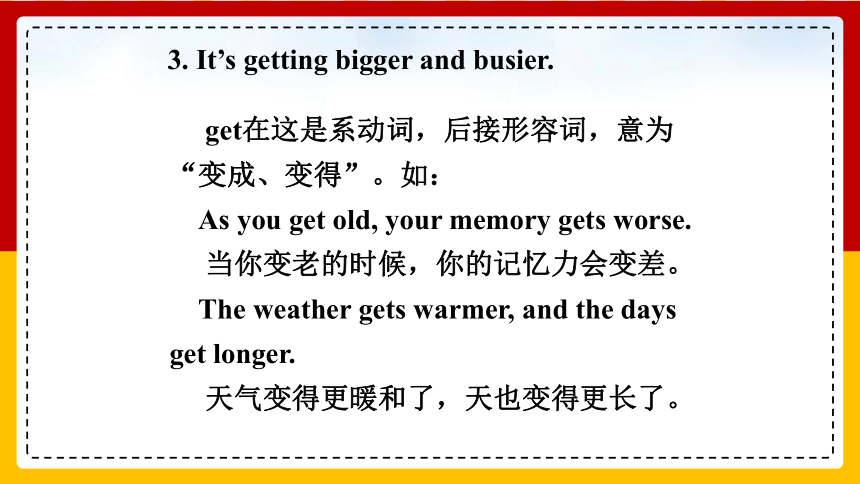

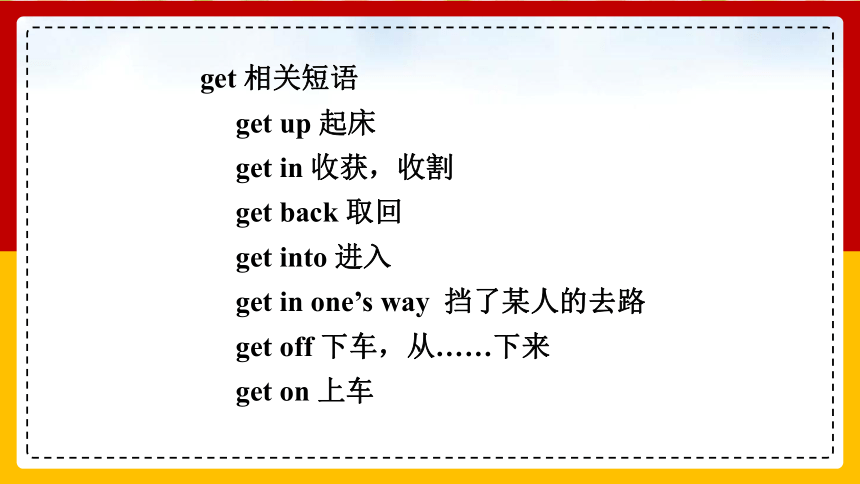
文档简介
(共26张PPT)
外研版《初中英语》八年级上册
Module
2
Unit
1
pretty
在这里是作副词,意思是“相当地;非常;很”,修饰形容词或副词
I’m
pretty
sure
that
he’ll
say
yes.
我非常确定他会说是。
very,
quite,
pretty都可表示程度,按照语气的轻重可大致描述为:
quite
→
pretty
→
very
1.
Pretty
good!
What
a?pretty?little
garden!
多么漂亮的小花园!
Who
is
the?pretty?girl
sitting
beside
you?
??
坐在你旁边的那个漂亮女孩是谁?
pretty
adj.
漂亮的;机灵的,聪明的
1.
—
How
was
your
weekend,
Susan?
—
________
A.
Good
idea!
B.
Pretty
good!
C.
Sorry.
D.
I
don’t
know.
2.
翻译:孩子看上去相当健康。
(pretty)
B
The
child
looks
pretty
healthy.
2.
in
the
1980s
in
the
1980s
表示“20世纪80年代”。“
in
+
the
+
时间s”表示
“在某年代或特定世纪某年代”。如:
Cars
of
this
kind
were
made
in
the
1930s.
这种汽生产于二十世纪三十年代。
Great
changes
have
taken
place
in
China
in
the
1980s.
二十世纪八十年代中国发生了巨大变化。
(
)
My
uncle
moved
to
London
____
A.
in
the
fifties
B.
in
the
1980s
C.
in
his
fifties
D.
in
1980s
B
[Practice]
3.
It’s
getting
bigger
and
busier.
get在这是系动词,后接形容词,意为“变成、变得”。如:
As
you
get
old,
your
memory
gets
worse.
当你变老的时候,你的记忆力会变差。
The
weather
gets
warmer,
and
the
days
get
longer.
天气变得更暖和了,天也变得更长了。
get
还有“得到、获得;到达;收到”之意。如:
Where
did
you
get
the
book?
从哪儿能获得这本书?
Can
we
get
to
the
station
in
time?
我们能及时到达车站吗?
I
got
a
letter
from
Tom
this
morning.
我今天早上收到了汤姆的信。
get
相关短语
get
up
起床
get
in
收获,收割
get
back
取回
get
into
进入
get
in
one’s
way
挡了某人的去路
get
off
下车,从……下来
get
on
上车
get
on
well
with
与……相处融洽
get
out
离开、出去
get
ready
for
为……准备好
get
rid
of
除掉、去掉
get
to
know
认识
4.
population
population
n.
人口
是一个集体名词,当其用作主语时,谓语动词常用第三人称单数形式。如:
The
population
of
Paris
is
7
million.
巴黎的人口有七百万。
注意:表示人口的“多”或“少”,要用large或small,
不能用much或little。如:
China
has
a
large
population.
中国人口众多。
[拓展]
表达“某地有多少人口”通常有两种方法:
1)“The
population
of
+
某地+
be
+
数词”。如:
The
population
of
Shanghai
is
13
million.
上海的人口有一千三百万。
2)“某地+
has
a
population
of
+数词”。如:
Shanghai
has
a
population
of
13
million.
上海有一千三百万人。
[Practice]
请根据上句改写下句,使上下两句意思相
同或相近。
1.
What’s
the
population
of
Japan?
___________
people
__________
in
Japan?
What’s
the
___________
the
people
in
Japan?
number
of
How
many
are
there
2.
The
number
of
the
people
in
our
city
is
five
million.
___________________
our
city
is
five
million.
Our
city
has
________________
five
million.
___________
five
million
people
in
our
city.
There
are
The
population
of
a
population
of
(
)
The
experts
think
that
India’s
population
may
be
______
than
China’s
______
2020.
A.
many,
by
B.
more,
in
C.
larger,
by
解析:此题考查人口的“多”或“少”的表达,由于题目中有
than,要用比较级,故先排除A;而指“人口多”时要用
large,
故选
C。
C
—
What’s
_____
population
of
China?
—
China
has
______
population
of
1.3
billion.
A.
a;
the
B.
the;
a
C.
/;
/
D.
the;
the
—
______
is
the
population
of
the
town?
—
Over
20,000.
And
a
third
of
the
population
______
workers
of
the
car
factory.
A.
What;
are
B.
How
many;
are
C.
What;
is
D.
How
many;
is
B
A
5.
million
million
num.百万
million前有具体数字时,million后不能加s,如two
million(两百万);如果无具体数字时,
后面要加s并与of
连接,表示不确切的数字“数百万的……”,即millions
of。
He
was
prepared
to
pay
two
million.
他愿意支付200万。
A
careless
mistake
cost
the
company
millions
of
pounds.
一个粗心的错误使公司蒙受数百万镑的损失。
About
forty
________children
from
poor
families
still
need
________.
A.
million;help
B.
million;helps
C.
millions;
help
A
—
TB
(肺结核)
is
very
terrible.
—
Yes,
it
kills
_______
people
every
year.
A.
million
of
B.
some
million
of
C.
millions
of
D.
some
millions
of
C
hundred,
thousand,
million这些词的用法极为相似,需注意的用法有:
当这些词与具体数字连用时,通常不加复数词尾-s,也不后接介词
of。
2.
当这些词不与具体数字连用,而是表示不确定的泛指数时,则不仅要加复数词尾-s,而且要后接介词
of,然后才能接名词。
注
意:
There
are
about
two
______
students
in
the
newly
built
school.
A.
thousand
B.
thousands
C.
thousand
of
D.
thousands
of
答案:A
解析:当hundred,
thousand,
million,
billion等词前有确切数字时,这些词应
用单数形式。
—
What’s
the
population
of
Shanghai?
—
It
has
a
population
of
13
million.
—
Is
Hong
Kong
bigger
than
Shanghai?
—
No.
Shanghai
is
bigger
than
Hong
Kong.
1.
—
上海有多少人口?
—
一千三百万人口。
2.
—
香港比上海大吗?
—
不,上海比香港大。
Translate
the
sentences.
4.
哪一个更繁华一些,上海还是香港?
In
winter
Shanghai
is
colder
than
Hong
Kong.
Which
is
busier,
Shanghai
or
Hong
Kong?
3.
上海的冬天比香港冷。
1.This
pen
is
______
than
that
one.
(long)
2.
It’s
______
and
_______than
Cambridge.
(big,
busy)
3.
Who
is
________
(heavy),
you
or
your
brother?
4.
Is
Shanghai
_______
in
winter
than
Hong
Kong?(hot)
5.
Planes
are
________
(fast)
than
trains.
faster
heavier
hotter
bigger
busier
longer
Fill
in
the
blanks.
外研版《初中英语》八年级上册
教学课件
非常感谢收看
外研版《初中英语》八年级上册
Module
2
Unit
1
pretty
在这里是作副词,意思是“相当地;非常;很”,修饰形容词或副词
I’m
pretty
sure
that
he’ll
say
yes.
我非常确定他会说是。
very,
quite,
pretty都可表示程度,按照语气的轻重可大致描述为:
quite
→
pretty
→
very
1.
Pretty
good!
What
a?pretty?little
garden!
多么漂亮的小花园!
Who
is
the?pretty?girl
sitting
beside
you?
??
坐在你旁边的那个漂亮女孩是谁?
pretty
adj.
漂亮的;机灵的,聪明的
1.
—
How
was
your
weekend,
Susan?
—
________
A.
Good
idea!
B.
Pretty
good!
C.
Sorry.
D.
I
don’t
know.
2.
翻译:孩子看上去相当健康。
(pretty)
B
The
child
looks
pretty
healthy.
2.
in
the
1980s
in
the
1980s
表示“20世纪80年代”。“
in
+
the
+
时间s”表示
“在某年代或特定世纪某年代”。如:
Cars
of
this
kind
were
made
in
the
1930s.
这种汽生产于二十世纪三十年代。
Great
changes
have
taken
place
in
China
in
the
1980s.
二十世纪八十年代中国发生了巨大变化。
(
)
My
uncle
moved
to
London
____
A.
in
the
fifties
B.
in
the
1980s
C.
in
his
fifties
D.
in
1980s
B
[Practice]
3.
It’s
getting
bigger
and
busier.
get在这是系动词,后接形容词,意为“变成、变得”。如:
As
you
get
old,
your
memory
gets
worse.
当你变老的时候,你的记忆力会变差。
The
weather
gets
warmer,
and
the
days
get
longer.
天气变得更暖和了,天也变得更长了。
get
还有“得到、获得;到达;收到”之意。如:
Where
did
you
get
the
book?
从哪儿能获得这本书?
Can
we
get
to
the
station
in
time?
我们能及时到达车站吗?
I
got
a
letter
from
Tom
this
morning.
我今天早上收到了汤姆的信。
get
相关短语
get
up
起床
get
in
收获,收割
get
back
取回
get
into
进入
get
in
one’s
way
挡了某人的去路
get
off
下车,从……下来
get
on
上车
get
on
well
with
与……相处融洽
get
out
离开、出去
get
ready
for
为……准备好
get
rid
of
除掉、去掉
get
to
know
认识
4.
population
population
n.
人口
是一个集体名词,当其用作主语时,谓语动词常用第三人称单数形式。如:
The
population
of
Paris
is
7
million.
巴黎的人口有七百万。
注意:表示人口的“多”或“少”,要用large或small,
不能用much或little。如:
China
has
a
large
population.
中国人口众多。
[拓展]
表达“某地有多少人口”通常有两种方法:
1)“The
population
of
+
某地+
be
+
数词”。如:
The
population
of
Shanghai
is
13
million.
上海的人口有一千三百万。
2)“某地+
has
a
population
of
+数词”。如:
Shanghai
has
a
population
of
13
million.
上海有一千三百万人。
[Practice]
请根据上句改写下句,使上下两句意思相
同或相近。
1.
What’s
the
population
of
Japan?
___________
people
__________
in
Japan?
What’s
the
___________
the
people
in
Japan?
number
of
How
many
are
there
2.
The
number
of
the
people
in
our
city
is
five
million.
___________________
our
city
is
five
million.
Our
city
has
________________
five
million.
___________
five
million
people
in
our
city.
There
are
The
population
of
a
population
of
(
)
The
experts
think
that
India’s
population
may
be
______
than
China’s
______
2020.
A.
many,
by
B.
more,
in
C.
larger,
by
解析:此题考查人口的“多”或“少”的表达,由于题目中有
than,要用比较级,故先排除A;而指“人口多”时要用
large,
故选
C。
C
—
What’s
_____
population
of
China?
—
China
has
______
population
of
1.3
billion.
A.
a;
the
B.
the;
a
C.
/;
/
D.
the;
the
—
______
is
the
population
of
the
town?
—
Over
20,000.
And
a
third
of
the
population
______
workers
of
the
car
factory.
A.
What;
are
B.
How
many;
are
C.
What;
is
D.
How
many;
is
B
A
5.
million
million
num.百万
million前有具体数字时,million后不能加s,如two
million(两百万);如果无具体数字时,
后面要加s并与of
连接,表示不确切的数字“数百万的……”,即millions
of。
He
was
prepared
to
pay
two
million.
他愿意支付200万。
A
careless
mistake
cost
the
company
millions
of
pounds.
一个粗心的错误使公司蒙受数百万镑的损失。
About
forty
________children
from
poor
families
still
need
________.
A.
million;help
B.
million;helps
C.
millions;
help
A
—
TB
(肺结核)
is
very
terrible.
—
Yes,
it
kills
_______
people
every
year.
A.
million
of
B.
some
million
of
C.
millions
of
D.
some
millions
of
C
hundred,
thousand,
million这些词的用法极为相似,需注意的用法有:
当这些词与具体数字连用时,通常不加复数词尾-s,也不后接介词
of。
2.
当这些词不与具体数字连用,而是表示不确定的泛指数时,则不仅要加复数词尾-s,而且要后接介词
of,然后才能接名词。
注
意:
There
are
about
two
______
students
in
the
newly
built
school.
A.
thousand
B.
thousands
C.
thousand
of
D.
thousands
of
答案:A
解析:当hundred,
thousand,
million,
billion等词前有确切数字时,这些词应
用单数形式。
—
What’s
the
population
of
Shanghai?
—
It
has
a
population
of
13
million.
—
Is
Hong
Kong
bigger
than
Shanghai?
—
No.
Shanghai
is
bigger
than
Hong
Kong.
1.
—
上海有多少人口?
—
一千三百万人口。
2.
—
香港比上海大吗?
—
不,上海比香港大。
Translate
the
sentences.
4.
哪一个更繁华一些,上海还是香港?
In
winter
Shanghai
is
colder
than
Hong
Kong.
Which
is
busier,
Shanghai
or
Hong
Kong?
3.
上海的冬天比香港冷。
1.This
pen
is
______
than
that
one.
(long)
2.
It’s
______
and
_______than
Cambridge.
(big,
busy)
3.
Who
is
________
(heavy),
you
or
your
brother?
4.
Is
Shanghai
_______
in
winter
than
Hong
Kong?(hot)
5.
Planes
are
________
(fast)
than
trains.
faster
heavier
hotter
bigger
busier
longer
Fill
in
the
blanks.
外研版《初中英语》八年级上册
教学课件
非常感谢收看
同课章节目录
- Module 1 How to learn English
- Unit 1 Let's try to speak English as much as possi
- Unit 2 You should smile at her.
- Unit 3 Language in use .
- Module 2 My home town and my country
- Unit 1 It's taller than many other buildings.
- Unit 2 Cambridge is a beautiful city in the east o
- Unit 3 Language in use .
- Module 3 Sports.
- Unit 1 Nothing is more exciting than playing tenni
- Unit 2 This year we training more carefully.
- Unit 3 Language in use .
- Module 4 Planes, ships and trains .
- Unit 1 He lives the farthest from school.
- Unit 2 What is the best way to travel.
- Unit 3 Language in use .
- Module 5 Lao She Teahouse.
- Unit 1 I wanted to see the Beijing Opera.
- Unit 2 It descibes the changes in Chinese society.
- Unit 3 Language in use .
- Module 6 Animals in danger.
- Unit 1 It allows people to get closer to them .
- Unit 2 The WWF is working hard to save them all.
- Unit 3 Language in use .
- Revision module A
- Module 7 A famous story
- Unit 1 Alice was sitting with her sister by the ri
- Unit 2 She was thinking about her cat.
- Unit 3 Language in use .
- Module 8 Accidents
- Unit 1 While the car were changing to red, a car s
- Unit 2 I was trying to pick it up when it bite me
- Unit 3 Language in use .
- Module 9 Population
- Unit 1 The population of China is about 1.37 billi
- Unit 2 Arnwick was a city with 200,000 people.
- Unit 3 Language in use .
- Module 10 The weathe
- Unit 1 It might snow.
- Unit 2 The weather is fine all year round.
- Unit 3 Language in use .
- Module 11 Way of life
- Unit 1 In China ,we open a gift later.
- Unit 2 In England, you usually drink tea with milk
- Unit 3 Language in use .
- Module 12 Help
- Unit 1 What should we do before help arrives?
- Unit 2 Stay away from windows and heavy furniture.
- Unit 3 Language in use .
- Revision module B
